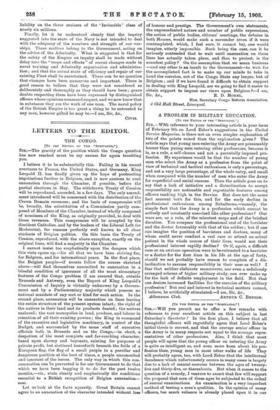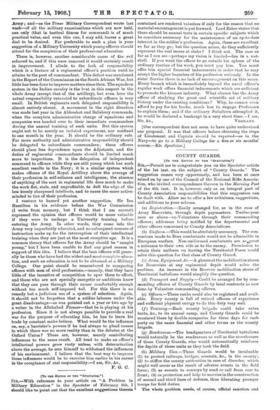[TO Till EDITOR OF TH1 "sroarrieroa."1 you permit me to
offer a few remarks with reference to your excellent article on this subject in last Saturday's Spectator? In the first place, I believe that all thoughtful officers will regretfully agree that Lord Esher's initial thesis is correct, and that the average senior officer in the Army is in many respects not equal to the average repre- sentatives of other professions. Also, I think that most people will agree that the young officer on entering the Army is quite as intelligent as, and even more keen about his pro- fession than, young men in most other walks of life They will probably agree, too, with Lord Esher that the intellectual decadence which unfortunately occurs in many cases is largely due to a lack of mental exercise between the ages of twenty- five and thirty-five, or thereabouts. But when it comes to the question of a remedy, I venture to assert that few will support the proposal that men of these ages be subjected to the ordeal of annual examinations. An examination is a very imperfect method of testing a man's qualities. In the opinion of many officers, too much reliance is already placed upon it in our Army ; and—as the Times Military Correspondent wrote last week—of all the military examinations which are now held, one only (that in tactical fitness for. command) is of much practical value, and even this one, I may add, leaves a great deal to be desired. Far preferable to such a plan is your suggestion of a Military University which young officers should attend for the completion of their professional education.
There is, however, another considerable cause of the evil referred to, and if this were removed it would certainly result in improvement. I allude to the lack of responsibility which is a feature of a regimental officer's position until he attains to the post of commandant. This defect was mentioned in the Report of the Commission on the South African War, but little has been done to improve matters since then. The squadron system in the Indian cavalry is the best in this respect in the whole Army (except that of the artillery), but even here the actual responsibility entrusted to subordinate officers is very small. In British regiments such delegated responsibility is almost entirely absent. A movement in the right direction was made last year in the Aldershot and Salisbury commands, when the complete administrative charge of squadrons and companies was handed over to their immediate commanders during the annual training of such units. But this system ought not to be merely an isolated experiment, nor confined to one month in the year. It should be the ordinary rule. Far more authority and administrative responsibility should be delegated to subordinate commanders; these officers should place less dependence upon the Adjutants, and the duties of regimental commandants should be limited much more to inspections. It is the delegation of independent command to officers while they are still young which has such excellent results in the Navy; it is a similar system which makes officers of the Royal Artillery above the average of their profession in self-reliance and intelligence; the absence of anything of the sort in regimental life does much to make the work flat, stale, and unprofitable, to dull the edge of the less keenly sharpened intellects, and to cause the more active- minded to tire of their profession.
I venture to hazard yet another suggestion. Sir Ian Hamilton in his evidence before the War Commission
(I write from memory, but I think that I am correct) expressed the opinion that officers would be more valuable if they were to undergo a University training before entering the Army. In other words, they come into the Army very imperfectly educated, and no subsequent courses of instruction make up for the interruption of their intellectual training when they are just at the most receptive age. It is a common theory that officers for the Army should be "caught young," but I have been unable to find any good reason in support of this idea. I believe that the best officers will gener- ally be those who have had the widest and most complete educa- tion, and such an education is not to be obtained at a Military College. One point should be remembered in comparing officers with men of civil professions,—namely, that they have little of the incentive of competition to spur them to effort, and those who are not specially energetic or ambitious know that they can pass through their career comfortably enough without too much self-imposed toil. For this there is no remedy but a judicious use of a system of selection. Again, it should not be forgotten that a soldier labours under the great disadvantage—as was pointed out a year or two ago by a writer in the Allahabad Pioneer—that he is playing at his profession. Since it is not always possible to provide a real war for the purpose of educating him, he has to learn his trade by constant make-believe. What would be the influence on, say, a barrister's powers if he had always to plead causes in which there was no more reality than in the debates at the Oxford Union ? These are, however, merely contributing influences to the same result. All tend to make an officer's intellectual powers grow rusty unless, with determination above the average, he sets himself to withstand the influences of his environment. I believe that the best way to improve those influences would be to exercise him earlier in his career in the acceptance of real responsibility.—I am, Sir, &c., F. G. C.





































 Previous page
Previous page